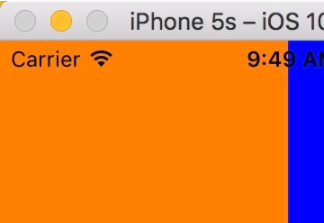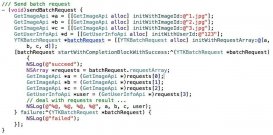在没有步入正文之前先给大家展示下效果图,如果大家觉得很满意请继续往下阅读全文。

大家可以看到这个界面很简单,其实就是uitableview的布局,但是难点是在于如何从网上下载这些图片,下载之后应如何进行存储!
我们一步一步进行解析,先从单线程(主线程)进行多图片下载我们布局上的文字及图片的地址从plist文件中进行读取

根据结构,我们自定义一个数据模型文件
ddzapp.h
|
1
2
3
4
5
6
7
8
9
10
|
#import <foundation/foundation.h>@interface ddzapp : nsobject//图标@property (nonatomic,strong) nsstring *icon;//名字@property (nonatomic,strong) nsstring *name;//下载量@property (nonatomic,strong) nsstring *download;+ (instancetype)appwithdict:(nsdictionary *)dict;@end |
ddzapp.m
|
1
2
3
4
5
6
7
8
|
#import "ddzapp.h"@implementation ddzapp+ (instancetype)appwithdict:(nsdictionary *)dict {ddzapp *app = [[self alloc] init];[app setvaluesforkeyswithdictionary:dict];return app;}@end |
以下的都是视图控制器中的代码
viewcontroller.m
1.
|
1
2
3
4
5
6
|
@interface viewcontroller ()//所有数据@property (nonatomic,strong)nsarray *apps;//内存缓存图片@property (nonatomic,strong)nsmutabledictionary *imgcache;@end |
第一个属性用于存储读取plist文件中的内容,设置为属性保存起来,就可以不用重复读取
第二个属性用于保存从网上下载下来的图片,也是为了不用重复读取
2.
|
1
2
3
4
5
6
7
8
9
10
11
12
13
14
15
16
17
18
19
20
21
22
|
@implementation viewcontroller//读取数据- (nsarray *)apps {if (!_apps) {//从plist文件中读取数据nsarray *dictarray = [nsarray arraywithcontentsoffile:[[nsbundle mainbundle] pathforresource:@"apps.plist" oftype:nil]];nsmutablearray *apparray = [nsmutablearray array];for (nsdictionary *dict in dictarray) {[apparray addobject:[ddzapp appwithdict:dict]];}_apps = apparray;}return _apps;}//缓存图片- (nsmutabledictionary *)imgcache {if (!_imgcache) {//初始化_imgcache = [nsmutabledictionary dictionary];}return _imgcache;} |
这两个方法都是为了初始化刚才的两个属性
3.
|
1
2
3
4
5
6
7
8
9
10
11
12
13
14
15
16
17
18
19
20
21
22
23
24
25
26
27
28
29
30
31
32
33
34
35
36
37
38
39
40
41
42
|
#pragma mark - 数据源方法- (nsinteger)tableview:(uitableview *)tableview numberofrowsinsection:(nsinteger)section {return self.apps.count;}- (uitableviewcell *)tableview:(uitableview *)tableview cellforrowatindexpath:(nsindexpath *)indexpath {static nsstring *id = @"app";uitableviewcell *cell = [tableview dequeuereusablecellwithidentifier:id];ddzapp *app = self.apps[indexpath.row];cell.textlabel.text = app.name;cell.detailtextlabel.text = app.download;//先从内存中取出图片uiimage *image = self.imgcache[app.icon];if (image) {cell.imageview.image = image;}else {//内存中没有图片//将图片文件数据写入到沙盒中nsstring *cachespath = [nssearchpathfordirectoriesindomains(nscachesdirectory, nsuserdomainmask, yes) firstobject];//获得文件名nsstring *filename = [app.icon lastpathcomponent];//计算出文件的全路径nsstring *file = [cachespath stringbyappendingpathcomponent:filename];//加载沙盒的文件数据nsdata *data = [nsdata datawithcontentsoffile:file];//判断沙盒中是否有图片if (data) {//直接加载沙盒中图片cell.imageview.image = [uiimage imagewithdata:data];//存到字典(内存)中self.imgcache[app.icon] = cell.imageview.image;}else {//下载图片data = [nsdata datawithcontentsofurl:[nsurl urlwithstring:app.icon]];cell.imageview.image = [uiimage imagewithdata:data];//存到内存中self.imgcache[app.icon] = cell.imageview.image;//将图片数据写入到沙盒中[data writetofile:file atomically:yes];}}return cell;} |
这两个方法是uitableview必须要实现的方法
第一个是返回数据量,没什么好说的
第二个是绑定数据
具体的流程看下图

以上内容针对ios多线程实现多图片下载(一)的相关介绍,希望对大家有所帮助,下篇文章继续给大家介绍ios多线程实现多图片下载(二),感兴趣的朋友请持续关注。
















